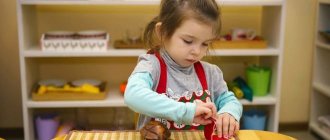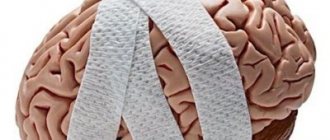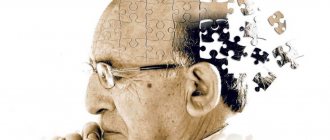Has it ever happened that you ask your child to do something and he doesn't do it? You should not jump to conclusions and assume that your child is disobedient or simply inattentive. The cause may be a completely different problem: poor memory. Most young children are very active and absorb all information like sponges. But it is often difficult for them to save and then reproduce what they heard or saw.
Poor memory in a child: reasons
It is worth noting that many children, or rather their parents, do not know about the child’s poor memory before he enters first grade. After all, it is at this moment that the number of tasks increases, so it is very difficult for the child to concentrate and perform at his best. There are several main reasons why a child may suffer from poor memory.
First grader
Causes of poor memory in a child:
- Wrong daily routine . The point is to activate all the brain centers, make memorization easier, there is no need to put pressure on the child and load him with constant cramming. Try to do loads by alternating. That is, alternate physical as well as mental activities. Accordingly, the best option would be to study for about an hour, then go for a walk or some kind of section where the child can do physical exercises, running, or strength training. This is the optimal routine. Pay attention to your baby's bedtime and wake time. Very often, poor memory can be caused by the fact that the child does not fall asleep well or goes to bed late. Accordingly, he does not have enough sleep, because of this he cannot concentrate and work productively during the day.
- Insufficient amounts of vitamins and minerals . The fact is that some vitamins, as well as microelements, help improve memory. Accordingly, their lack can provoke poor memorization. In this case, it is necessary to periodically give the child vitamins, and also review his diet in the direction of increasing the amount of healthy foods. Give preference to fresh fruits, vegetables, fish and meat. Don't forget dairy products. You should not give your child a variety of fast food and sweets. Although two sweets won't do anything bad. After all, fast carbohydrates in the form of sugar are an excellent source of brain nutrition. They will come in handy when the child is a little tired and will help turn the brain centers into work.
- Insufficient memory training . That is, the child is pedagogically neglected. Most often this occurs in children with poor speech. After all, the development of speech really indicates how well the child’s memory develops. If a child speaks poorly, swallows words, it is difficult for him to express his thoughts, he thinks for a long time about what he wants to say. Most likely there are some problems with memorization and memory.
- Another cause of poor memory in a child may be neurological disorders . Most often this is associated with difficult childbirth, cesarean, and prematurity of the child. Most often, such children, immediately after birth, are registered with a neurologist and given medications that stimulate brain activity. Accordingly, if you did not have any special problems during childbirth, but the child suffers from poor memory and all activities do not produce any results, it makes sense to consult a neurologist. A truly experienced specialist can prescribe medications that stimulate brain function and help your child learn.
IMPORTANT: It is best not to delay this, because over time these problems will become much more serious and it will be difficult for the student to absorb a large amount of information. After all, it is precisely from kindergarten, in the primary grades, that the child’s memory is formed in order to prepare him for further education.
At school
Memory training in children 2-6 years old
This is a period of active formation and development of memory; children become “why-seekers” - they are interested and curious about everything that surrounds them. They learn letters and numbers, master reading, writing, and arithmetic operations.
At this age, involuntary memorization predominates, so information with a plot and emotional overtones is better remembered. Kids practically do not perceive dry facts.
The Doman technique at this age is used both for memorizing new words and for playing games. For example, you can ask your child to find an extra element among the cards or combine images into groups based on some characteristic.
To help your child remember information faster, teach him mnemonics methods - for example, the method of associations. Ask the child to name what he associates this object with, and then, when trying to remember, prompt the association.
Be sure to include play exercises to develop memory in your baby’s daily schedule. Some of them are given below.
Word game
Tell your baby a few words and ask him to repeat them. Over time, complicate the task - increase the number of words, ask them to repeat them, maintain order.
Finding differences
Show your child pictures with similar images and ask him to find the differences. This exercise trains memory, develops attentiveness and the ability to concentrate.
Purchases
When you go to the store, ask your child to remember a list of 3-5 products. And in the store, give them the task of remembering them. The task can be complicated by increasing the number of positions.
If your child doesn't like an exercise, don't insist on doing it. Offer him a choice of any other task from those that arouse interest.
Poor memory in a child: types of medications and their effects
Initially, you need to try to improve the child’s memory through training. There are entire complexes for this. The easiest option is to learn poems with children. This method is best suited for children who go to kindergarten. By the way, this will be good training for further preparation for school. By learning poetry well, a child will quickly remember the alphabet and learn to read.
However, if such methods do not give results, and you have not moved forward, the baby still has a very difficult time remembering poetry, and it takes several hours to learn a small quatrain, then it makes sense to turn to medications. It is worth noting that there are a huge number of means for improving memory; their action can be based on different substances. The safest and most harmless are special vitamin complexes for memory. They contain a large amount of minerals and trace elements, as well as vitamins that promote memory.
On learning
Types of medications for poor memory in a child:
- Sedatives and antidepressants will help improve memory You may ask, how do these medications help improve memory? The fact is that scientists have found that people who are depressed actually suffer from memory impairment. This condition negatively affects memory and deteriorates the functioning of the brain and all systems in the body as a whole. Accordingly, if a child suffers from depression, or there is bullying or harassment at school, then, of course, it is best to give the child antidepressants and eliminate the irritating factor. In addition, such drugs may act slightly differently. Nowadays, herbal infusions, as well as special herbal components, are given for this purpose. Many of them can actually significantly improve memory.
- Substances that affect the functioning of the brain, improving its activity. Most often, such drugs are prescribed for traumatic brain injuries, strokes, and coronary artery disease. They are often given during recovery from a concussion. However, these drugs are popular with a neurologist if the child’s poor memory is due to some kind of disease. In particular, this may be increased intracranial pressure, birth trauma, as well as some organic brain damage. The child may have been injured and hit his head hard. In this case, these drugs will indeed help improve blood circulation in the brain, which will improve the child’s memory.
- It is worth noting that medications that stimulate brain function are sold only with a doctor's prescription. That is, they are not available for free sale. But they are not recommended to be given to children who do not suffer from neurological illnesses or diseases. However, if a child has any indications for use, then it is imperative to contact a neurologist. However, this most often happens in exceptional cases, when the child has really serious problems with memorization, and he cannot remember the quatrain within two hours. Indeed, in this case it is necessary to sound the alarm. We recommend that your child, who is absolutely healthy, use herbal preparations.
Homework
How to determine if there are memory impairments?
You should definitely make sure that the reason is not lack of sleep. If a child plays computer games or watches TV until late at night, memory may be problematic. You definitely need to calculate how much time a day your child spends sleeping. It must be at least 10 hours. It is this sleep that is incomplete for a child. The quality of children's memory depends not only on sleep and training. Don't forget about the individuality of each person. But despite this, the development of a child’s memory is a very real thing. Experienced, qualified specialists can advise and schedule a special set of individual exercises and classes to develop memory. Such tasks are completed by the child at home under the supervision of the parents.
To figure out whether a child actually remembers information poorly, two scientists Susan Gathercole and Tracy Alaway provided a list of problems a child with memory impairments has:
- The child has problems in social relationships with children.
- Has difficulty answering direct questions.
- Cannot behave according to instructions.
- Unable to complete assigned tasks.
- Inattentive.
- Cannot complete the task of processing and storing information.
- A 4 year old child has poor memory.
You can read in this article where to send your child at 4 years old. How to force them to do their homework, read here.
How to teach a child to read, read the link
Poor memory in a child: medications
Review of medications for poor memory in children:
- Ginkgo biloba extract has proven itself to be excellent and is called the drug Bilobil. Ginseng extract has a good effect on memory. It is also quite a good remedy and stimulates the brain. In general, ginseng improves the functioning of the entire body and strengthens all systems.
Bilobil - One of the most effective drugs for depression is Glycine. This is nothing more than a sedative that improves brain function due to the fact that it calms the body. Accordingly, it makes sense to give the drug if the child is very nervous, suffers from excessive stress, and is also in a state of depression. It is also prescribed to infants if the child was born prematurely, as a result of which he sleeps very poorly, constantly cries and has nervous tics. In this case, this drug is really indicated.
Glycine - Medicines that improve brain function and stimulate blood circulation in it. Most often, such drugs are prescribed after traumatic brain injuries or as a result of very difficult childbirth. These drugs should not be purchased independently. Most often they are sold by prescription, so it is unlikely that you will be able to purchase them. They are the most effective and are indicated only if the child has some kind of neurological disorder. Among them we can highlight Cortexin.
Cortexin - Intellan. This is a combination product that contains plant extracts. That is, there are no chemical or artificial substances in it. The preparation contains ginkgo biloba and five more extracts of various plants. In general, the drug has a calming effect and also helps improve blood circulation in the brain. Indeed, it is recommended for children who are developmentally delayed and do not study well. Since the drug is completely herbal, only positive effects are observed from it, and there are practically no contraindications.
Intellan - Piracetam contains a substance of the same name, which is a synthetic analogue of aminobutyric acid. Thanks to the effects of this drug, the blood vessels of the brain dilate, reducing susceptibility to various nerve impulses. Accordingly, the child thinks faster and remembers information. This drug is also recommended for use before exams, under heavy study loads. The drug is also prescribed to older people to reduce the manifestation of sclerosis and other diseases associated with memory impairment.
Piracetam - Biotredin. This drug contains amino acids that improve brain activity. Do not be alarmed when you read in the instructions that this drug is prescribed for the treatment of alcoholism. Yes, indeed, this medicine is prescribed to patients with alcoholism to restore and improve brain function. However, the drug is also intended for teenagers, as well as children under 15 years of age, with excessive fatigue and memory impairment. The amino acids that make up the drug also improve the condition of the brain, improving blood circulation in it. In addition, the drug has a sedative effect and generally relaxes the entire body.
Biotredin - Cerebrolysin. This drug, which is sold as an injection, is a kind of first aid for improving brain function. Most often, injections are used for traumatic brain injuries, after a stroke or serious brain damage. This drug should definitely not be used by absolutely healthy schoolchildren who suffer from increased fatigue. However, this is an excellent drug if the child suffers from neurological disorders and organic damage to the brain and nervous system.
Cerebrolysin - Phenibut. This drug belongs to psychostimulants, nootropic drugs. It is worth noting that it is prescribed in case of memory loss, poor learning, and also increased anxiety. Most often, the drug is prescribed in the presence of nervous tics, impaired learning, as a result of enuresis, stuttering, and children over 8 years of age. In general, the drug is a sedative and stimulates the brain, improving memory. The drug should not be used without a prescription. This is a medicine that is prescribed exclusively by a doctor and taken according to indications. Most often, the drug is prescribed if a child has nervous tics, as a result of which memory decreases. There is no need to give this drug to absolutely healthy children.
Phenibut - Cerakson. The drug contains citicoline. This is a substance that helps improve brain function. Most often prescribed after traumatic brain injury, to improve brain function. In addition, it is prescribed for degenerative disorders of the brain and the death of some of its cells. The drug is recommended after strokes; it is also indicated for children who suffer from reduced attentiveness syndrome and have very poor learning. Most often, this drug is prescribed after neurological disorders that were noted in childhood. It helps improve brain function and also prevents the situation from getting worse. The drug is sold as an injection, as well as syrup for children.
Cerakson - Somazina. This drug also contains citicoline, that is, it is an analogue of the previous one. Prescribed for memory impairment, as well as memory deterioration. In addition, it is given after traumatic brain injury to improve brain function and reduce traumatic syndrome. The drug is sold in the form of sachets and syrup. The drug is not prescribed to children, but neurologists give this drug even to babies under the age of 1 year. The drug stimulates brain function and also helps to significantly improve memory. It is most often used in the treatment of children who have neurological disorders, which is why they suffer from memory impairment.
Somazina
Features of memory in childhood
Have you noticed that years later only the most vivid events remain in your memory, which are supported by strong good or bad emotions? That's right, moments like these are the ones you remember the most. Now imagine that a child is hyper-emotional about everything, the number of impressions from what he saw, heard, and tried is many times greater, since often something happens to him for the first time. Therefore, childhood memories tend to be longer lasting. Especially, if you ask an elderly person about his life, then a good half will be phrases from childhood.
A child has poor memory - what to do?
A child has poor memory - tips:
- If you do not want to give drugs to children, you can try to improve it with special activities. If you see that your child grasps certain information much better, try to give it in that form.
- It's no secret that some children really have better visual memory, while others, on the contrary, perceive information much more effectively by ear. That is, auditory memory is much better. Depending on the child’s sensitivity, choose the method of presenting the material.
- That is, if a child has visual memory, then give him information in the form of some drawings, letters, printed text or some kind of presentations. If your child has developed auditory memory, try to talk and read aloud more.
- Ask him to say everything out loud when completing tasks, and also to read the tasks out loud so that his ears catch the information. It is worth noting that to improve memory with the help of exercises, a complex is performed, as well as special classes. If possible, send your child to a memory development center. If not, he can study at home on his own.
Child has poor memory
Workload as an influence on poor memory
First you need to analyze its workload. It must be taken into account that lessons, various sports and dance activities, watching TV, books - all this leads to overwork. You should think about how much time he spends outside, breathes air, whether he eats well, whether he sleeps enough time, and whether his daily and weekly routine is structured correctly. A child gets no less tired during the day than a healthy adult.
If a child has irregularities in the daily diet, lack of sleep, excessive work, sports and moral stress, then restoration of strength during sleep at night may not occur. It is important to remember that solving this problem is not so difficult: you just need to normalize the baby’s daily routine and monitor the situation. In particularly advanced cases, of course, one cannot do without medical consultations, so as not to worsen the existing problem. Sometimes school mistakes depend on poorly trained memory. This problem is solvable, provided that mom and dad pay enough attention to their child, treating failure with understanding, without haste, nerves and irritation, improving the development of children's memory.
If the child has difficulty expressing his own thoughts, tries to talk about the situation, but he does not have enough words for this, jumps from one thought to another and cannot finish the ending, while the child’s speech is not sufficiently developed for his age - these are symptoms of memory problems. It is worth reviewing all the reasons in turn. A busy day - “unload”. It is imperative to provide a place in the schedule for street walks and recreation. All unnecessary sections and circles that may overload it should be eliminated. Of course, every parent dreams of the versatility of their child, but with this problem, it should be noted that health is much more expensive.
How to improve a child’s memory: tasks, methods
As for preschool children, it is best to present information to them in a playful way, and also to develop memory with the help of poems, tongue twisters, and interesting rhymes. Start with the simplest and most fun. These could be some kind of ditties, songs, poems. Everything that is learned in kindergarten is done for a reason, but with the goal of developing the child’s memory and stimulating brain function. This is a kind of preparation of the child for school.
Tasks for a child’s poor memory:
- The child may have a really bad grasp of information, but there is no need to be upset. The simplest option is to use a quatrain. Say the quatrain several times, and starting from the third time, ask the child to finish the sentence. Have the child say the last word in the line first, then the last two words in the line, and then three. In this way, the child will be able to fully master the entire poem.
- Oddly enough, but learning dances also contributes to memory development. The simplest option is the dance of little ducklings. What does dance have to do with memory? The fact is that in the case of learning dances, the child’s visual memory improves, and his attention is focused specifically on the movements. Accordingly, the child picks up the oscillatory, translational movements of the arms and legs, and will be able to reproduce them. If your child has trouble remembering poetry, try teaching him to dance. This really helps improve memory.
- Tell stories to your child. Try somewhere in the middle or at the beginning to ask what the kid thinks about the main character, how he imagines him. Such small digressions really help improve memory and memorization. Next time the child will be able to clearly tell you what the fairy tale was about and who the main character is. Tell a fairy tale about the Gray Wolf and Little Red Riding Hood, then ask what color the wolf’s fur was, and what color the main character of the fairy tale’s hat was. Attention to detail also develops a child's memory.
- Try to ask the baby what he did during the day in the garden, what he ate today, and what he remembered. When dressing your child for kindergarten or school in the morning, focus on the color of the underwear or some details that are depicted on the swimming trunks. When your child comes home from school, ask if he remembers what color his swimming trunks are and what is depicted on them. Oddly enough, it really works and helps train your memory. Also, be mindful and pay attention to details during the weekend or when spending time at home. Ask where he left his things, how the wheels are dismantled, and what color the bus was on today. This all helps to concentrate and improve memory.
Activities with the child
No matter how strange these methods may seem, by the beginning of the school year the child will really show good progress in memorization. Children whose parents focused on details and little things really learn to read and write faster and are easy to teach.
General recommendations
We give general recommendations to parents to help develop their children’s memory:
- Talk to your children. Find out from them how they are doing, what’s new.
- Every day, memorize at least a quatrain, a tongue twister and a proverb.
- Learn a foreign language. Memorizing foreign words is an excellent memory training.
- Pay attention to associations, pay attention to the characteristics of objects, their colors, individual details, aroma. Thanks to this, images are drawn in the child’s memory that facilitate the memorization process. Figurative thinking allows you to better remember poetry and text. If a child visually imagines what is being said, then the lines are easier for him to remember.
Memory development is a labor-intensive and difficult process, the deterioration of which should not be left to chance. Otherwise, serious problems may arise at school age. If you devote at least 15 minutes a day to memory development, you will be able to maintain this important function for many years.










